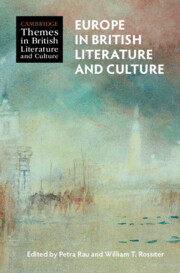Book contents
- Europe in British Literature and Culture
- Cambridge Themes in British Literature and Culture
- Europe in British Literature and Culture
- Copyright page
- Contents
- Illustrations
- Contributors
- General Editor’s Preface
- Acknowledgements
- Introduction
- Part I Zones of Influence
- Part II Pan-European Moods and Movements
- Part III Cultural Transfers
- Chapter 12 Early Modern Print Technologies
- Chapter 13 Diplomacy
- Chapter 14 Grand Tours and Sentimental Journeys
- Chapter 15 Folk and Fairy Tales
- Chapter 16 Translation
- Chapter 17 More or Less English
- Chapter 18 Holocaust Education and Commemoration in Britain
- Chapter 19 Critical and Literary Theory
- Chapter 20 Culinary Longings
- Part IV Anxious Neighbourhoods, Uncertain Futures
- Index
Chapter 19 - Critical and Literary Theory
from Part III - Cultural Transfers
Published online by Cambridge University Press: 06 June 2024
- Europe in British Literature and Culture
- Cambridge Themes in British Literature and Culture
- Europe in British Literature and Culture
- Copyright page
- Contents
- Illustrations
- Contributors
- General Editor’s Preface
- Acknowledgements
- Introduction
- Part I Zones of Influence
- Part II Pan-European Moods and Movements
- Part III Cultural Transfers
- Chapter 12 Early Modern Print Technologies
- Chapter 13 Diplomacy
- Chapter 14 Grand Tours and Sentimental Journeys
- Chapter 15 Folk and Fairy Tales
- Chapter 16 Translation
- Chapter 17 More or Less English
- Chapter 18 Holocaust Education and Commemoration in Britain
- Chapter 19 Critical and Literary Theory
- Chapter 20 Culinary Longings
- Part IV Anxious Neighbourhoods, Uncertain Futures
- Index
Summary
British literary criticism and theory have always been primarily focused on meaning and on value, that is, on the interpretation and evaluation of literary texts. Equally characteristic are their strong sense of having a social mission and their interest in the social value of texts. On the continent, criticism and theory developed in a wholly different, ‘scientific’ direction. The Russian Formalists tried to define the ‘literariness’ of literary texts, the Prague Linguistic Circle introduced the notion of ‘structure’, phenomenologists were concerned with the ontological status of the literary work, and the structuralists of the 1960s and after analysed that narrative and its presentation, with interpretation and evaluation always playing a marginal role. The advent of poststructuralism – whose reception in the UK was markedly different from that in the United States – brought the two traditions substantially closer to each other, but there has not been a real convergence.
- Type
- Chapter
- Information
- Europe in British Literature and Culture , pp. 306 - 321Publisher: Cambridge University PressPrint publication year: 2024

